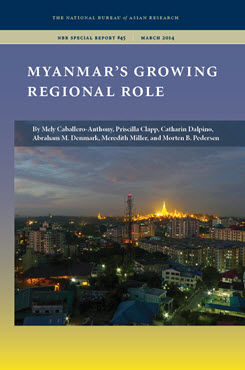Second Chance
Prospects for U.S.-Myanmar Relations
This essay is part of the report “Myanmar’s Growing Regional Role,” which explores the issues surrounding Myanmar’s re-emergence as a regional power and outline implications for U.S. policy in relation to Myanmar and Southeast Asia as a whole.
EXECUTIVE SUMMARY
This essay examines how Myanmar’s emergence in regional affairs adds a new dimension to the geostrategic calculus in the Asia-Pacific and argues that the country’s opening provides a unique opportunity for the U.S. and Myanmar to map out a new bilateral relationship.
MAIN ARGUMENT
The history of U.S.-Myanmar relations is marked by periods of long estrangement, which gives the two countries limited experience with one another and constrains the ability of the U.S. to influence Myanmar’s political development. Over the past two decades, U.S. policymakers have focused on the National League for Democracy and its leader, Aung San Suu Kyi. However, the pool of potential leaders is expanding, and Washington must consider a number of possible outcomes to the 2015 elections. Bilateral economic and trade relations are largely free of sanctions but have nonetheless been slow to develop. Cooperation in this area is focused more on positioning Myanmar to benefit from trade with the U.S. at a future point. As Myanmar becomes the nexus of connectivity on mainland Southeast Asia, its importance to U.S. security policy will increase. This will require stronger military‑to‑military relations, which is arguably the most sensitive area of policy.
POLICY IMPLICATIONS
- Even if it eventually produces a democratic system, the political reform process in Myanmar will be uneven and long. A policy that aims to sustain the momentum of liberalization without requiring a specific electoral outcome will be the most effective in the long run.
- Although U.S. companies might not take the lead in the current “gold rush,” trade with the U.S. promises technology transfer and higher labor standards for Myanmar.
- At this juncture, U.S. security interests may best be served by supporting Myanmar in its policy of developing stronger relations with several powers rather than by pressing the country to lean toward the U.S. in particular.
- The U.S. military should nurture a fraternal relationship with its counterpart in Myanmar as political conditions permit. This will not only encourage more democratic civil-military relations in Myanmar but also enable the two militaries to develop rudimentary interoperability for joint cooperation.


